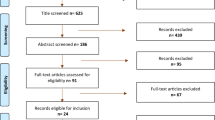Abstract
Although the terms mentor and thesis advisor (or research supervisor) are often used interchangeably, the responsibilities associated with these roles are distinct, even when they overlap. Neither are role models necessarily mentors, though mentors are role models: good examples are necessary but not sufficient. Mentorship is both a personal and a professional relationship. It has the potential for raising a number of ethical concerns, including issues of accuracy and reliability of the information conveyed, access, stereotyping and tracking of advisees, and the abuse of power. Nevertheless, mentors can be critically important for professional success and are one of a number of elements that affect the responsible conduct of research. In addition, the community as a whole has a responsibility to mentor junior members.
Similar content being viewed by others
References
Hall, Roberta H. and Sandler, Bernice R. (1983) Academic mentoring for women students and faculty: A new look at an old way to get ahead, Association of American Colleges, Washington, D.C.
Swazey, Judith P. and Anderson, Melissa S. (1996) Mentors, advisors and role models in graduate and professional education, Association of Academic Health Centers, Washington, D.C.
Anderson, Melissa S., Oju, Elo Charity and Falkner, Tina M.R. (2001) Help from Faculty: Findings from the Acadia Institute Graduate Education Study, Science and Engineering Ethics 7: 487–503.
Swazey, Judith P. (1993) Teaching ethics: Needs, opportunities, and obstacles, In: the Proceedings of the Sigma Xi Forum, “Ethics, Values and the Promise of Science” (pp. 233–242), Sigma Xi, The Scientific Research Society, Research Triangle Park, NC.
Fischer, Beth A. and Zigmond, Michael J. (2001) Promoting Responsible Conduct in Research through “Survival Skills” Workshops: Some Mentoring Is Best Done in a Crowd. Science and Engineering Ethics 7: 563–587.
Bird, S.J. (1994) Overlooked aspects in the education of science professionals: Mentoring, ethics, and professional responsibility, Journal of Science Education and Technology 3: 49–55.
Gorovitz, Samuel (1998) Ethical Issues in Graduate Education, Science and Engineering Ethics 4: 225–240.
Olmstead, M.A. (1993) Mentoring new faculty: Advice to department chairs, CSWP Gazette 13(1): 108–11.
National Academy of Sciences (1997) Advisor, teacher, role model, friend: On being a mentor to students in science and engineering, National Academy Press, Washington, D.C.
Faddis, Bonnie, Ruzicka, Patricia, Berard, Barbara, and Huppertz, Nancy (1988) Hand In Hand: Mentoring Young Women, Newton, Massachusetts: Centre for Sex Equity, Women’s Educational Equity Act.
Weil, Vivian (2001) Mentoring: Some Ethical Considerations, Science and Engineering Ethics 7: 471–482.
Eastwood, Susan, Derish, Pamela, Leash, Evangeline, and Ordway, Stephen (1996) Ethical issues in biomedical research: Perceptions and practices of postdoctoral research fellows responding to a survey, Science and Engineering Ethics 2: 89–114.
Abeles, Norman (1998) Commentary on “Scientific societies and whistleblowers: The relationship between the community and the individual”, Science and Engineering Ethics 4: 115–117.
Association for Women in Science (1993) Mentoring Means Future Scientists, Washington, D.C.
Gadlin, Howard (1994, February) A male perspective in mediating sexual harassment. Paper presented at the Annual Meeting of the American Association for the Advancement of Science, San Francisco, CA.
Author information
Authors and Affiliations
Corresponding author
Rights and permissions
About this article
Cite this article
Bird, S.J. Mentors, advisors and supervisors: Their role in teaching responsible research conduct. SCI ENG ETHICS 7, 455–468 (2001). https://doi.org/10.1007/s11948-001-0002-1
Issue Date:
DOI: https://doi.org/10.1007/s11948-001-0002-1




